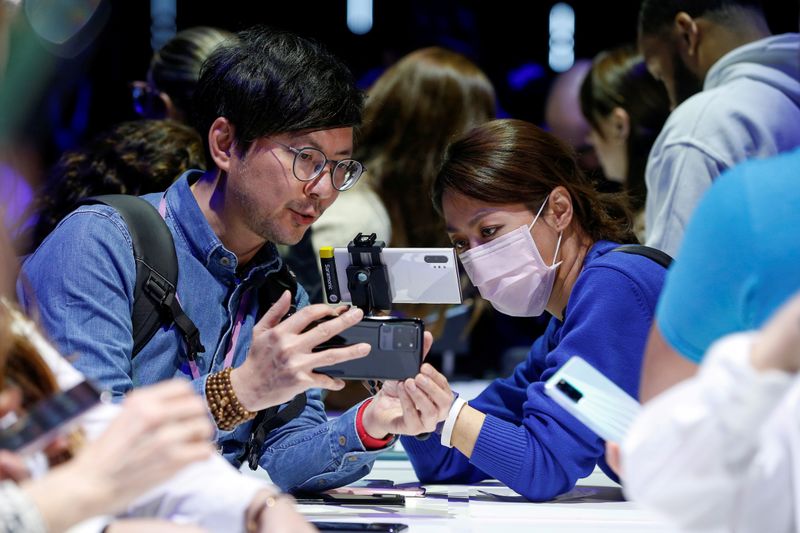This post was originally published on this site
https://i-invdn-com.akamaized.net/trkd-images/LYNXMPEG1H0B5_L.jpg
By Hyunjoo Jin
SEOUL (Reuters) – Samsung Electronics (KS:) stands to be a major beneficiary of the China production problems announced by rival Apple Inc (NASDAQ:) on Monday, reaping the rewards of a decade-long bet on low-cost smartphone manufacturing in Vietnam.
Half of Samsung’s smartphones are now made in Vietnam, where the coronavirus that has crippled the China operations of Apple and many other firms has so far had only a limited impact on its production.
Apple said on Monday it would not meet its revenue guidance for the March quarter due to the coronavirus impact on both production and sales in China, where most iPhones are made. Chinese smartphone maker Xiaomi Corp last week also flagged a hit to its March quarter sales.
Huawei, another major Samsung rival, has not announced any production problems, but Samsung insiders, analysts and suppliers expect it will also be hit hard due to its heavy reliance on Chinese manufacturing and parts. Many Chinese and foreign firms have begun to re-open China factories that were idled for weeks, but shortages of workers and other problems have in many cases kept output to a minimum.
Samsung has also largely ceded the China market to its rivals in recent years, meaning it won’t suffer from the store closures and drop in demand that is hitting Apple and others.
“Samsung is better positioned to weather the virus fallout than its formidable rivals such as Huawei and Apple,” a person with knowledge of Samsung’s supply chain told Reuters.
“The virus exposed China risks. We feel fortunate that we were able to escape the risks,” he said.
Another person familiar with Samsung’s thinking told Reuters: “Samsung does not say it publicly. But it is relieved.”
Still, two sources familiar with Samsung’s Vietnam operations cautioned that should the virus outbreak be prolonged, Samsung would feel the impact, as the company sources many components from China.
Problems with cross-border shipments also cropped up in the early phases of the virus outbreak as Vietnam imposed stricter border controls, according to Hong Sun, vice chairman of Korea Chamber of Business in Vietnam. The issues have since been resolved, Sun said, but risks remain if Chinese parts suppliers cannot get back to work.
Samsung also relies on Chinese contract manufacturers for some low-end models.
In a statement to Reuters, the company said: “We are making our best effort to minimize any impact on our operations.”
TrendForce recently cut its first quarter production forecasts for Huawei by 15% and Apple by 10%. It cut projections for Samsung Electronics by a smaller 3%.
Before the virus, the global smartphone market had been expected to end two consecutive years of falls, driven by smartphones running on faster 5G wireless networks. But the virus outbreak will throw cold water on any rebound, with global shipments likely to record another decline.
Since starting phone production in Vietnam in 2009, Samsung has aggressively boosted output through cheaper labor and generous government incentives. A number of South Korean suppliers followed suit, powering its breakneck growth.
Samsung ended its own smartphone production in China last year as its market share plunged to nearly zero.
Apple makes most of its iPhones in China via Chinese company Foxconn. Manufacturing facilities there that produce Apple’s iPhone and other electronics have begun to reopen, but they are ramping up more slowly than expected, Apple said on Monday.
Last week, Samsung unveiled a trio of flagship Galaxy s20 smartphones as well as its new foldable phone. Sources said the virus could delay new product launches by rivals.

